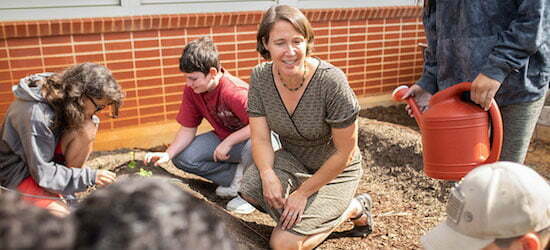ASAP likes to share the stories of people who help us fulfill our mission. This month, we talk with Amanda Clapp, a middle school science teacher at the Catamount School, a learning lab school operated by Western Carolina University in partnership with Jackson County Schools.
Tell us about the garden at the Catamount School. How did it get started?
The garden at the Catamount School started as a rectangle of mulch. The students were excited to start all sorts of garden projects, and the sixth grade started to really develop it through a project-based learning unit. We got a Growing Minds school garden mini-grant, and students made three raised beds and amended soil to get it ready. The first year, we grew lima beans and sunflowers.
The next year’s students expanded the garden after visiting the community gardens run by the Jackson County health department and an organic farm in our community. They added three long mounds of amended soil after determining that they didn’t need the raised beds. Over the summer, our lemon cucumbers have grown across all those mounds, and we will be sharing a huge cucumber salad at our family picnic this week. We also have more big sunflowers, carrots, kale, and beans.
What are you doing to get the garden ready for the new school year?
I haven’t done anything to get the garden ready, because the kids can do it when they come back next week. They created a tall table out of pressure-treated lumber, and they use it as an accessible potting bench. I know they’re looking forward to using it.
What are some of the science lesson crossovers you’ve used with the garden?
The garden has been a place for sixth grade to study plants, soils, and biomes. We also use it as an outdoor classroom. Our seventh grade uses the weather station and eighth grade does water cycle infiltration studies. Speaking of water, our STEM-E team worked out a rainwater collection system with gravity-fed irrigation that runs to the beds and keeps them watered during dry times.
Why is it important to offer farm to school experiences, particularly for middle school students?
Having an outdoor space right outside our windows allows students to apply what they’re learning in real time. Students have built benches, started a compost pile, and hung bird feeders in the garden as they learned different concepts in class and advisory. Our middle school students benefit from bringing school concepts outdoors—they can see the connection between school and the rest of their lives and their community.

